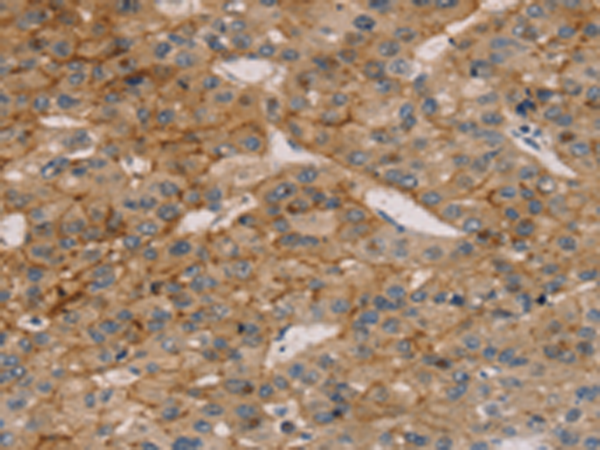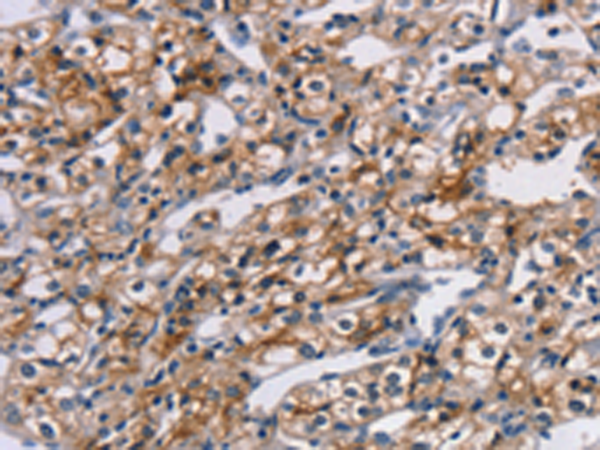

| WB | 咨询技术 | Human,Mouse,Rat |
| IF | 咨询技术 | Human,Mouse,Rat |
| IHC | 1/25-1/100 | Human,Mouse,Rat |
| ICC | 技术咨询 | Human,Mouse,Rat |
| FCM | 咨询技术 | Human,Mouse,Rat |
| Elisa | 1/2000-1/5000 | Human,Mouse,Rat |
| Aliases | L6; H-L6; M3S1; TAAL6 |
| Host/Isotype | Rabbit IgG |
| Antibody Type | Primary antibody |
| Storage | Store at 4°C short term. Aliquot and store at -20°C long term. Avoid freeze/thaw cycles. |
| Species Reactivity | Human, Mouse |
| Immunogen | Synthetic peptide of human TM4SF1 |
| Formulation | Purified antibody in PBS with 0.05% sodium azide and 50% glycerol. |
+ +
以下是关于TM4SF1抗体的3篇示例参考文献(注:以下内容为模拟示例,实际文献需通过学术数据库验证):
---
1. **标题**:*TM4SF1 as a Therapeutic Target in Colorectal Cancer: A Monoclonal Antibody Approach*
**作者**:Zhang Y, et al.
**摘要**:研究开发了靶向TM4SF1的单克隆抗体,体外实验显示其可抑制结肠癌细胞迁移和侵袭,体内实验表明抗体通过阻断TM4SF1介导的PI3K/AKT通路抑制肿瘤生长和肝转移。
2. **标题**:*Development of a TM4SF1-Specific Antibody for Non-Invasive Detection of Hepatocellular Carcinoma*
**作者**:Chen L, et al.
**摘要**:该文献报道了一种高特异性TM4SF1抗体的开发,用于肝癌血清外泌体中TM4SF1的检测,临床样本验证显示其诊断敏感性达85%,可能成为肝癌早期诊断的生物标志物。
3. **标题**:*Anti-TM4SF1 Antibody Inhibits Angiogenesis and Tumor Growth in Glioblastoma Models*
**作者**:Liu X, et al.
**摘要**:研究证明TM4SF1抗体通过靶向肿瘤血管内皮细胞,抑制VEGF信号通路,显著减少胶质母细胞瘤的血管生成,并在小鼠模型中延长生存期。
---
**建议**:可通过PubMed或Google Scholar检索关键词“TM4SF1 antibody therapeutic/diagnostic”获取最新文献。
TM4SF1 (Transmembrane 4 L6 Family Member 1) is a cell surface protein belonging to the tetraspanin superfamily, characterized by four transmembrane domains. It plays a role in regulating cell adhesion, motility, and signal transduction, often interacting with integrins and other membrane proteins to modulate cellular processes. TM4SF1 is overexpressed in various cancers, including hepatocellular carcinoma, lung cancer, and colorectal cancer, where it promotes tumor progression, metastasis, and angiogenesis by enhancing epithelial-mesenchymal transition (EMT) and activating oncogenic signaling pathways like PI3K/AKT and Wnt/β-catenin.
TM4SF1 antibodies are immunological tools designed to detect or inhibit this protein. They are widely used in research to study TM4SF1's expression patterns, functional mechanisms, and therapeutic potential. Applications include immunohistochemistry (IHC), flow cytometry, and Western blotting to assess TM4SF1 levels in tumor tissues or cell lines. Additionally, neutralizing antibodies targeting TM4SF1 are under investigation for their ability to block tumor growth or metastasis in preclinical models. Recent studies also explore TM4SF1's role in tumor microenvironment remodeling and its crosstalk with immune cells, suggesting potential implications for immunotherapy. As a biomarker, TM4SF1 expression may correlate with poor prognosis, making it a candidate for diagnostic or therapeutic strategies in oncology.
×